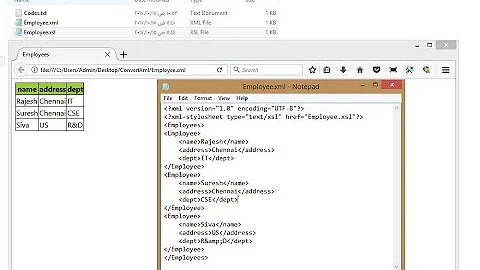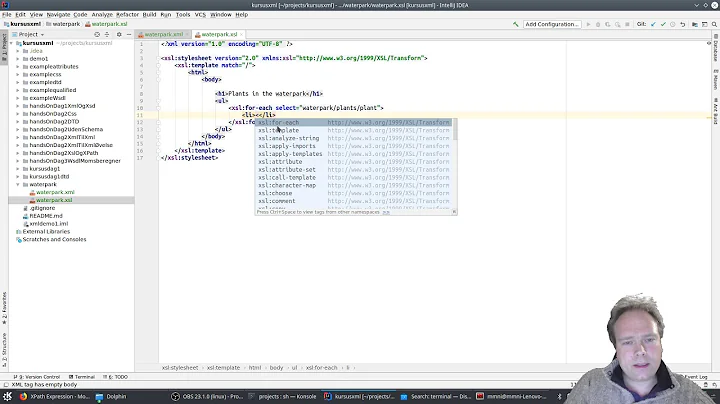XSLT: How to convert XML Node to String
49,322
Solution 1
You need to serialize the nodes. The most simple for your example would be something like
<xsl:template match="ROOT">
<xsl:variable name="nodestring">
<xsl:apply-templates select="//A" mode="serialize"/>
</xsl:variable>
<xsl:value-of select="$nodestring"/>
</xsl:template>
<xsl:template match="*" mode="serialize">
<xsl:text><</xsl:text>
<xsl:value-of select="name()"/>
<xsl:text>></xsl:text>
<xsl:apply-templates mode="serialize"/>
<xsl:text></</xsl:text>
<xsl:value-of select="name()"/>
<xsl:text>></xsl:text>
</xsl:template>
<xsl:template match="text()" mode="serialize">
<xsl:value-of select="."/>
</xsl:template>
The above serializer templates do not handle e.g. attributes, namespaces, or reserved characters in text nodes, but the concept should be clear. XSLT process works on a node tree and if you need to have access to "tags", you need to serialize the nodes.
Solution 2
Based on @jelovirt solution, here is a more complete piece of code:
<xsl:template match="*" mode="serialize">
<xsl:text><</xsl:text>
<xsl:value-of select="name()"/>
<xsl:apply-templates select="@*" mode="serialize" />
<xsl:choose>
<xsl:when test="node()">
<xsl:text>></xsl:text>
<xsl:apply-templates mode="serialize" />
<xsl:text></</xsl:text>
<xsl:value-of select="name()"/>
<xsl:text>></xsl:text>
</xsl:when>
<xsl:otherwise>
<xsl:text> /></xsl:text>
</xsl:otherwise>
</xsl:choose>
</xsl:template>
<xsl:template match="@*" mode="serialize">
<xsl:text> </xsl:text>
<xsl:value-of select="name()"/>
<xsl:text>="</xsl:text>
<xsl:value-of select="."/>
<xsl:text>"</xsl:text>
</xsl:template>
<xsl:template match="text()" mode="serialize">
<xsl:value-of select="."/>
</xsl:template>
Solution 3
In XSLT Version 3.0. See this W3 link for fn:serialize. This worked for me using SaxonPE.
<?xml version="1.0" encoding="ISO-8859-1"?>
<xsl:stylesheet version="3.0" xmlns:xsl="http://www.w3.org/1999/XSL/Transform" xmlns:output="http://www.w3.org/2010/xslt-xquery-serialization">
<xsl:variable name="output">
<output:serialization-parameters>
<output:method value="html"/>
</output:serialization-parameters>
</xsl:variable>
<xsl:template match="div">
<xsl:value-of select="serialize(., $output/output:serialization-parameters)" />
</xsl:template>
</xsl:stylesheet>
Solution 4
<xsl:template name="serializeNodeToString">
<xsl:param name="node"/>
<xsl:variable name="name" select="name($node)"/>
<xsl:if test="$name">
<xsl:value-of select="concat('<',$name)"/>
<xsl:for-each select="$node/@*">
<xsl:value-of select="concat(' ',name(),'="',.,'" ')"/>
</xsl:for-each>
<xsl:value-of select="concat('>',./text())"/>
</xsl:if>
<xsl:for-each select="$node/*">
<xsl:call-template name="serializeNodeToString">
<xsl:with-param name="node" select="."/>
</xsl:call-template>
</xsl:for-each>
<xsl:if test="$name">
<xsl:value-of select="concat('</',$name,'>')"/>
</xsl:if>
</xsl:template>
Solution 5
Saxon required for following solution. I find it here
<?xml version="1.0" encoding="UTF-8"?>
<xsl:stylesheet version="2.0" xmlns:saxon="http://saxon.sf.net/"
xmlns:xsl="http://www.w3.org/1999/XSL/Transform">
<!-- To serialize with saxon:serialize() -->
<xsl:output name="default" indent="yes"
omit-xml-declaration="yes" />
<xsl:template match="*">
<xsl:variable name="node-set">
<xsl:element name="level1">
<xsl:element name="level2" />
<xsl:element name="level2" />
</xsl:element>
</xsl:variable>
<xsl:element name="input">
<xsl:copy-of select="$node-set" />
</xsl:element>
<xsl:element name="output">
<xsl:value-of select="saxon:serialize($node-set, 'default')" />
</xsl:element>
</xsl:template>
</xsl:stylesheet>
Related videos on Youtube
Author by
Kalyan
Updated on July 09, 2022Comments
-
Kalyan almost 2 years
<ROOT> <A> <B>TESTING</B> </A> </ROOT>XSL:
<xsl:variable name="nodestring" select="//A"/> <xsl:value-of select="$nodestring"/>I am trying to convert XML nodeset to string using XSL. Any thoughts?
-
 mikey almost 13 yearsYou want the output to be: <A><B>TESTING</B></A> ?
mikey almost 13 yearsYou want the output to be: <A><B>TESTING</B></A> ? -
Kalyan almost 13 yearsmikey - exactly the same output i need.
-
 mikey almost 13 yearsGot it working on my end and posted below.
mikey almost 13 yearsGot it working on my end and posted below. -
 Emiliano Poggi almost 13 yearsIn that case the output you want would be
Emiliano Poggi almost 13 yearsIn that case the output you want would be<A><B<TESTING>/B></A>I think. Otherwise you can simply usexsl:copy-of.
-
-
Kalyan almost 13 yearsThanks mikey. I want to store the output of <xsl:copy-of> to a variable. As soon as I store it, it loses the tag information.
-
 mikey almost 13 yearsWell we are putting the nodes into the variable. To output the tag info, you can do it with copy-of. It is not lost it just depends how you display it. value-of will only display the tag values not the tags themselves.
mikey almost 13 yearsWell we are putting the nodes into the variable. To output the tag info, you can do it with copy-of. It is not lost it just depends how you display it. value-of will only display the tag values not the tags themselves. -
Kalyan almost 13 years<input type="hidden" name="hiddenxml"> <xsl:attribute name="value"><xsl:copy-of select="$nodes"/></xsl:attribute></input>. If I do this, only the value comes out, instead of entire xml string
-
 Emiliano Poggi almost 13 years@Kalyan, that's correct. You can't copy nodes into an attribute as value. You need to correctly escape the tags.
Emiliano Poggi almost 13 years@Kalyan, that's correct. You can't copy nodes into an attribute as value. You need to correctly escape the tags. -
 Emiliano Poggi almost 13 years@Kaylan, you then will populate the attribute as follows:
Emiliano Poggi almost 13 years@Kaylan, you then will populate the attribute as follows:<input type="hidden" name="hiddenxml"> <xsl:attribute name="value"><xsl:value-of select="$nodestring"/></xsl:attribute></input> -
 david.perez about 10 yearsThis feature needs the paid version of Saxon.
david.perez about 10 yearsThis feature needs the paid version of Saxon. -
Telic over 7 yearsThe feature is also available in Saxon-B
-
 Alejandro about 5 yearsIn order to show you how complex this task might become, check how this well formed XML
Alejandro about 5 yearsIn order to show you how complex this task might become, check how this well formed XML<test a='1"2'/>is wrongly handled by your solution. -
dlauzon over 4 yearsSample call of this template in a message, for debugging purposes:
<xsl:message><xsl:call-template name="serializeNodeToString"> <xsl:with-param name="node" select = "."/> </xsl:call-template></xsl:message>








